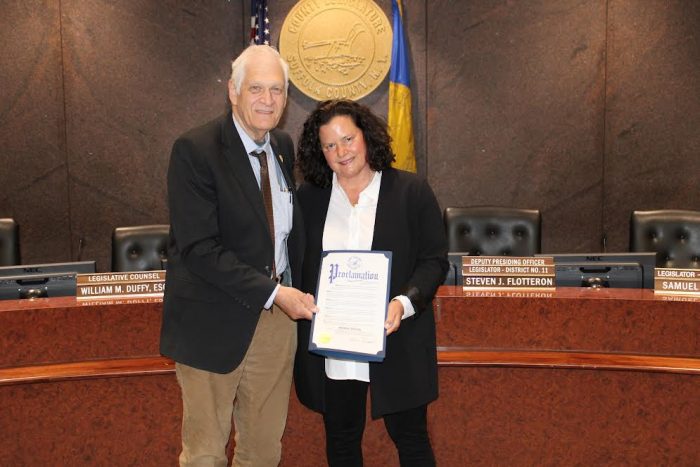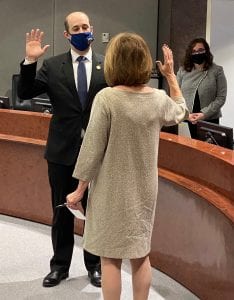Congrats, TBR News Media
Dear Leah,
You must be very proud of your continued recognition from the New York Press Association’s Better Newspaper Contest from your team’s work by receiving 11 awards this year. This is also a testament to your success as the founder and publisher of a weekly newspaper.
I believe hometown papers are an essential means to keep residents updated on what is happening in their community as they report on local government, schools, sports, entertainment, news and other items of interest.
I join with all of your readers in congratulating you and your staff and look forward to your continued success.
Rob Trotta
Suffolk County Legislator (R-Fort Salonga)
13th Legislative District
Sunrise Wind projections questionable
The Sunrise Wind project, as we were told in a March 23 TBR News Media article, “will use windmills to provide power to about 600,000 homes.” But what does this mean, exactly? It appears that 600,000 may have been selected as an arbitrary number, which may represent the number of homes that will derive 100% of their power requirements when all of the windmills are generating power at their maximum capacity, although this is not specifically stated in the article. But this raises the obvious question: For what percentage of the time will this be the case? We can only guess.
A much more helpful and meaningful terminology, in my opinion, would be to present these concepts in terms of energy, rather than power. Power is the rate at which energy is produced, or expended. To state that a windmill farm can produce a certain amount of power under ideal conditions, but neglect to mention the percentage of time this may be in effect, is to provide a very limited ability to understand the issue. A much more useful characterization would be to specify the total amount of energy generated in a fixed time, such as a year, compared to the total amount of energy required. For example, we might say something like, “The Sunrise Wind project will provide 45,000 MWh per year, which is 22% of the total energy required by Suffolk County.” (These are, of course, made-up numbers.) In this way, the complex variability of the wind strength becomes included in the energy notation, making the whole issue considerably easier to understand and evaluate.
Surely this issue is well understood by Sunrise Wind, and why they would choose to muddy the waters, as they have, is a matter for speculation. As Honest Abe Lincoln would have told us, a windmill farm can provide some of the power some of the time, or possibly all of the power some of the time, but it can provide none of the power most of the time.
George Altemose
Setauket
More Maryhaven discussions needed
We may be missing the forest for the trees in the process by which the Village of Port Jefferson is approaching this initiative to make an amendment to a long-standing village code for the Professional Office (PO)-zoned Maryhaven property. Residents had their first opportunity to hear and provide feedback as to what was being proposed at the standing-room-only public hearing during Monday’s Board of Trustees meeting, May 1.
Comments and concerns ranged from: Do what it takes to preserve the Maryhaven building; and, we need to know exactly what the plan is prior to a zoning change; to, have the Architectural Review Committee and Conservation Advisory Council been involved? Because we’ve known about the sale and vacancy for a very long time as a village; and, questions and concerns over the potential density as permitted via the draft code amendment (192+ units/~19 units per acre), coupled with the lack of a full environmental review (SEQRA) and sewage treatment related to the project. Other questions? Why didn’t we work with the owner of the property to secure an historic landmark designation and has water runoff into the neighborhoods below been considered?
The bottom line is that these questions are just the tip of the iceberg. Engagement with the developer by a select group of village officials had been ongoing, but the announcement of the pending sale (March 6, Deputy Mayor Snaden) followed by the public hearing request (April 3, Mayor Garant) ostensibly came from out of the blue for the rest of us and now we are playing catch up and the residents are as well.
There should have been more discussion about this building in the public sphere — years if not months ago; i.e., the ARC, CAC, Port Jefferson Historical Society, all could have been engaged.
Is it too late? We will see. But because the developer is working within a “timeline” as described by the mayor, this has suddenly become an urgent, time-sensitive matter. The public hearing remains open for three weeks.
I’d like to hear the public’s response to this and encourage feedback. What I heard May 1 was important, if not concerning. Please contact me at [email protected] if you have additional feedback.
Lauren Sheprow, Trustee
Village of Port Jefferson
Maryhaven: a potential spot zoning case
I was surprised to learn at the May 1 standing-room-only public hearing that the mayor, deputy mayor and village attorney have been in discussions with the developer for the proposed Maryhaven project for well over a year. Yet the first time the residents were made aware of this proposal was at a March 6 Port Jefferson Village Board of Trustees meeting.
While I applaud the Board of Trustees for their interest in preserving the historic Maryhaven building, their solution — changing the village code to achieve this goal — seems like the classic definition of spot zoning. This is the practice of singling out a specific property for a special zoning designation that differs from surrounding properties — an approach that is controversial and subject to challenge. During the hearing, the village attorney and mayor repeatedly said the purpose of the zone change was to preserve this historic building.
Significant concerns were raised about the scope and scale of the Maryhaven redevelopment that would be facilitated by the “relaxing” of existing limits in our code. Many good alternatives to the proposed code change were offered both by residents and trustees Lauren Sheprow and Rebecca Kassay. But there was near universal opposition to changing the village code to accommodate this project because of its potential for adverse impacts to this property and for other parts of the village.
If the village is serious about historic preservation, we need to explore code changes that would apply to more than just a single property. Also, funding opportunities for historic preservation should be vigorously researched and a report issued so that the village can make fully informed land use decisions.
Virginia Capon
Port Jefferson
Editor’s note: The writer formerly served as Port Jefferson Village trustee and chair of the Comprehensive Plan Committee.
Character assassination in PJ mayoral race
I came home from the May 1 Village of Port Jefferson public hearing elated. Village Hall was packed with residents who were there to weigh in on a code change that would affect the development of the Maryhaven building, encompassing people from all political stripes. Yet, here we were engaging in civil discourse and united in the goal of trying to find the best solutions for our community.
So I was stunned when I received a letter, the very next day, which can only be described as a character assassination on one of our mayoral candidates. The unsigned letter, which had no return address, purported to be from a “concerned villager,” and proceeded to attack trustee Lauren Sheprow in a vile manner.
I have the pleasure of knowing both candidates and refuse to believe either of them would ever condone such ugly politicking.
Last year, when we had an unusually competitive trustee campaign, the candidates remained civil. I trust Deputy Mayor Kathianne Snaden to maintain an even higher level of courtesy and respect, and am confident she will publicly condemn this offensive attack on her colleague.
Going forward, I hope all candidates will urge over-ardent supporters to refrain from personal assaults and focus on issues villagers care about.
Kathleen McLane
Port Jefferson
Snaden: a seasoned leader
It has recently come to my attention that we have an open mayor’s seat in the Village of Port Jefferson’s election taking place this June. Deputy Mayor Kathianne Snaden is running for the open seat, as well as newly elected trustee Lauren Sheprow.
We need to be mindful that the mayor’s office is no longer a place where a neophyte can just step in. The village is a small city, with two major hospitals, a train station, deep water harbor, school district, two business districts, large federal FEMA grants and major redevelopment projects underway uptown. It takes a seasoned, experienced person to be able to run this village and the $11.37 million budget in place.
Having been a trustee for less than one year, Sheprow does not bring experience to the table. She is rather in the middle of a very large learning curve, seeing to the day-to-day “ins and outs” of village policies, New York State law and municipal government — never mind the obligations of the mayor’s office. She has in fact, confessed herself on many occasions in public meetings that she hasn’t done a budget before and hasn’t run a public hearing.
On the other hand, you have Deputy Mayor Snaden, who has been working for years under the tutelage of Mayor Margot Garant. Snaden is a seasoned, experienced proven leader, with her own perspective and innovative ideas who is ready to take control.
In this election cycle, Sheprow would keep her seat if she loses her bid for mayor and would remain a trustee. If, on the other hand, Sheprow is elected we will have in office a neophyte mayor, and we will lose Snaden as she gives up her trustee position to run for mayor.
So, I ask you: Why would we vote for a rookie and lose the lead pitcher, when we can have them both on our team? Don’t forget, the last time a Garant [Jeanne] left office to an inexperienced mayor, our taxes went up. Let’s not let history repeat itself.
Lauren Auerbach
Port Jefferson
Vote ‘no’ on the May 16 school bond vote
My name is Teri Powers. I’m 63 years old, widowed, a resident and homeowner for 37 years.
Currently, we are on the LIPA tax burden (glide path), in which we have experienced increases in our tax bill, but the lion’s share of this burden is a result of that settlement, which will increase our current taxes by over 35% by the year 2027.
The Port Jefferson School District Board of Education is proposing a $15.9 million capital bond vote on Tuesday, May 16, at the high school between 6 a.m. and 9 p.m. A similar bond vote was defeated in December 2022. Please renew your enthusiasm and defeat this bond again.
Teri Powers
Port Jefferson
WRITE TO US … AND KEEP IT LOCAL
We welcome your letters, especially those responding to our local coverage, replying to other letter writers’ comments and speaking mainly to local themes. Letters should be no longer than 400 words and may be edited for length, libel, style, good taste and uncivil language. They will also be published on our website. We do not publish anonymous letters. Please include an address and phone number for confirmation.
Email letters to: [email protected]
or mail them to TBR News Media, P.O. Box 707, Setauket, NY 11733

















